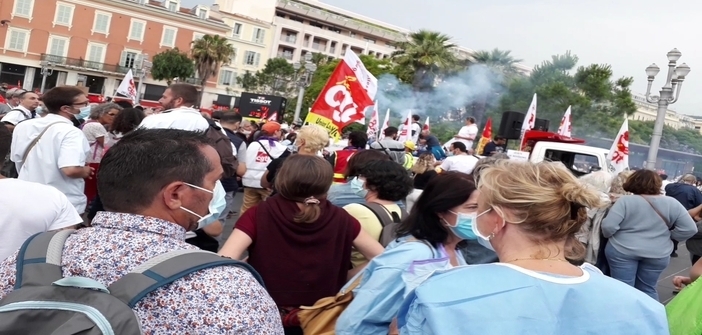Throughout France, healthcare workers and freelancers alike have come forward to denounce the abandonment by the State. They want better working conditions and to be recognized for their true value.
Flares, plastic medal throwing, and a truck with loudspeakers. In a cheerful atmosphere, the medical community was able to express their despair. They want to be able to treat patients in good conditions.
Poor consideration of needs
When discussing the healthcare reforms, the answer is always the same: “it’s smoke and mirrors”. Christèle Landrieux, a nurse in the operating room at the Grasse University Hospital, goes even further: “We have colleagues who tell us what’s going on. It’s just a two-hour weekly video conference. The speaking time is very limited. We talk about everything except the essential subjects.” Indeed, each time, the main demand remains the same: an increase in salaries and better working conditions.
Insufficient resources
This abandonment was also felt through the lack of equipment. Fortunately, the region was more or less spared. This was felt in the hospitals. “We tended to discuss restrictions. We had a reserve but were asked to be very cautious. Not everyone had access to FFP2 masks. We can’t say we were put in danger except for the last week when we ran out of gloves.”
However, according to everyone, this crisis did not begin with COVID-19. It simply highlighted the extent of the damage. Healthcare workers have seen the shortcomings of hospitals up close. According to them, this has been ongoing for years. This results in the disappearance of local hospitals.
With motivated students to continue
In Nice, Amauri, a fifth-year medical student, describes his routine which differs from the rest of France. “We weren’t requisitioned, but many volunteered to help, yet we had the necessary staff.” They had the unique status of being able to take exams. “Depending on the departments, hospital presence varied. As for me, I wasn’t there often.”
The hospital management model called into question
This protest can be summed up in three letters: T2A (activity-based pricing). Since Nicolas Sarkozy’s hospital reform in 2009, directors have been implemented. Simply put, employees denounce this system that compromises patient care. “T2A has killed the hospital because we’re paid based on activity produced. We don’t produce activity; we take care of people.”
But unwavering solidarity within the establishments
Some hospitals were spared the incessant wave of patients admitted to services. This is the case in Cannes. However, Laurence Laporte, FO secretary, states that this did not change matters compared to other French cities. “Mobilization was present regardless, staff had to reorganize and redeploy. Services changed, and schedule adjustments were made.”
A government equal to the crisis …
For hospital staff, there were shortcomings, and they are thus responsible for the major difficulties in hospitals. “They managed haphazardly, contradicted themselves, provided information then counter-information with ultimately no consistency.”
To try to fill the gaps left by the State, citizens turned to their local representatives like mayors. For example, David Lisnard, the Mayor of Cannes, was one of the most active during the crisis.
This is one of the reasons why the Cannes University Hospital did not lack anything. Many are convinced, like Laurence Laporte: “There was a total failure of our health system and our Ministry of Health. Without the solidarity of local officials, businesses, and individuals, it would have been complicated.”
Disheartened researchers
This wave of contagion completely disrupted their routines. As a result, they had to abandon all ongoing projects. “Now we operate solely through project calls. We no longer work on long-term projects. Those working long-term on COVID-related issues did not receive funding,” according to Sarah Labat-Jacqmin, a researcher-lecturer at the University of Nice Sophia Antipolis.
Freelancers silenced
This is the case for speech therapists. “We felt powerless at the beginning of the crisis. We didn’t have the necessary equipment to provide care. We weren’t even on the General Directorate of Health’s listing.” This shortage of resources resulted in several practices closing during the lockdown.
Beyond the crisis, they criticize the lack of visibility of speech therapists in the hospital environment. “Salary scales are not at all the same even though we have a BAC+5 degree level. But we are paid as if we were BAC+3.” This results in practitioners leaving hospitals.


